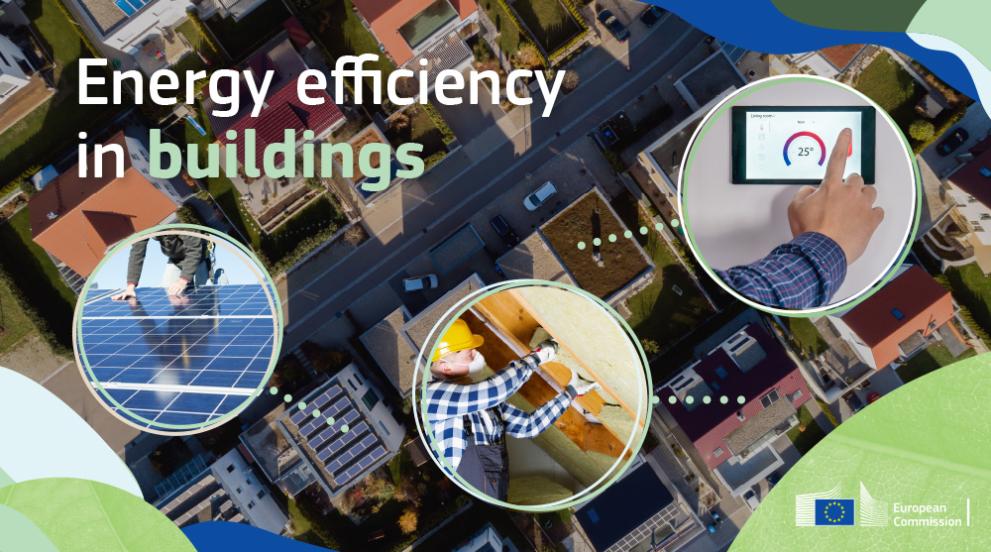
Buildings are a central part of our daily lives, and we spend a large part of our days in them - at home, at work, or during our spare time.
In its different forms - homes, work places, schools, hospitals, libraries or other public buildings - the built environment is, however, the single largest energy consumer in the EU. And one of the largest carbon dioxide emitters.
Collectively, buildings in the EU are responsible for 40% of our energy consumption and 36% of greenhouse gas emissions, which mainly stem from construction, usage, renovation and demolition.
Improving energy efficiency in buildings therefore has a key role to play in achieving the ambitious goal of carbon-neutrality by 2050, set out in the European Green Deal.
Reforming the EU building stock with the right policy and legislation
Today, roughly 75% of the EU building stock is energy inefficient. This means that a large part of the energy used goes to waste. Such energy loss can be minimised by improving existing buildings and striving for smart solutions and energy efficient materials when constructing new houses.
Renovating existing buildings could reduce the EU’s total energy consumption by 5-6% and lower carbon dioxide emissions by about 5%. Yet, on average, less than 1% of the national building stock is renovated each year. (Member State rates vary from 0.4% to 1.2%.) In order to meet our climate and energy objectives, the current rates of renovations should at least double.
The EU recently introduced new ambitious policies to help steer member states towards better energy efficiency in buildings. Knowing that cost is often the major hurdle to renovation, the new rules also ease access to financing for improving the building stock.
The Energy Performance of Buildings Directive (EPBD) 2010/31/EU and the Energy Efficiency Directive (EED) 2012/27/EU were revised in 2018, as part of the Clean energy for all Europeans package, to better reflect the EU’s aim of driving the clean energy transition.
Taken together, some of the most important elements in the directives include
- reinforced long-term renovation strategies for EU countries
- nearly zero-energy buildings
- energy performance certificates
- consideration for health and well-being (air pollution), e-mobility (e-charging points) and smart technology (smart meters, self-regulation equipment) in new buildings
EU countries need to write the new and revised provisions of the EPBD into national law by 10 March 2020.
In addition, each EU country needs to present its strategy for tackling energy in buildings for the period 2021-2030 through its integrated national energy and climate plans (NECPs). The cumulative impact of these efforts at national level will feed into the overall goal of reaching a 32.5% energy efficiency target by 2030 for the EU.
Innovating and investing for smarter buildings
Through Horizon 2020 research and innovation projects, the EU invests in grants or loans that help push technology and best practice in the sector. Appliances like smart meters, better performing materials and digital tools contribute to energy efficiency and can help consumers to better control their energy consumption, and save money.
The EU also supports and finance energy efficiency projects through the European Investment Bank (EIB), which lends money to projects that contribute to reaching the EU’s energy and climate goals.
To boost building renovation, the European Commission has announced the intention to launch the new 'renovation wave' initiative, as part of the European Green Deal. The aim is to increase the rate of renovation of existing buildings and bring together the different actors in the sector to develop financing possibilities, promote investments in buildings and pool renovation efforts.
Benefiting the environment and citizens
EU rules on energy efficiency in buildings show a clear and positive impact. Since the first measures were introduced under national building codes, the energy consumption in new buildings of today has halved, relative to typical buildings from the 1980s.
Besides the environmental gains from lower energy use, people across the EU will also benefit from improved energy efficiency in their homes, at work, in schools and other buildings. Energy efficient buildings will result in lower energy bills and reduced energy demand. In some cases they will also benefit from increased renewable energy sources. These changes will also lead to better air quality and improved health.
With certain renovation measures targeting social housing – and new rules for EU countries to measure and monitor figures for those that struggle to pay their energy bills – these building renovation rules will help to combat energy poverty in the EU and ensure that no citizen is left behind in the clean energy transition.
Examples on initiatives and projects in the sector
The EU Building Stock Observatory (BSO) is a tool that keeps track of the characteristics and energy performance of buildings in the EU.
Launched in 2016, the BSO monitors and assesses improvements in energy efficiency for buildings. The results are analysed and shown in a database, a data mapper and in factsheets. The BSO tracks many different aspects pf performance, for example
- energy efficiency levels in buildings in EU countries, and the EU as a whole
- different certification schemes and how they are implemented
- available investments for renovating buildings
- energy poverty levels across the EU.
BUILD-UP is the European portal for energy efficiency in buildings, and is managed by the Executive Agency for Small and Medium-sized Enterprises (EASME). Through dedicated training sessions, webinars, publications and country factsheets, BUILD-UP informs and equips stakeholders from the building sector with the skills and knowledge needed to ensure building and renovation projects meet energy efficiency requirements.
The Horizon 2020 energy efficiency data hub offers the possibility to find all existing EU financed projects, with a filter to identify “building” projects.
Print friendly pdf:
Details
- Publication date
- 17 February 2020
- Location
- Brussels
